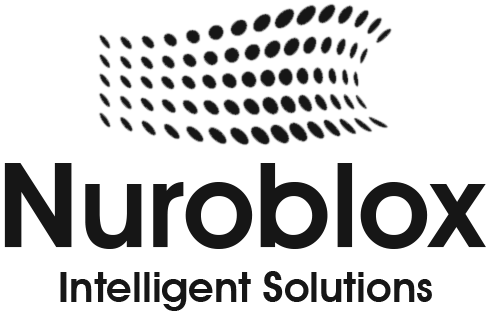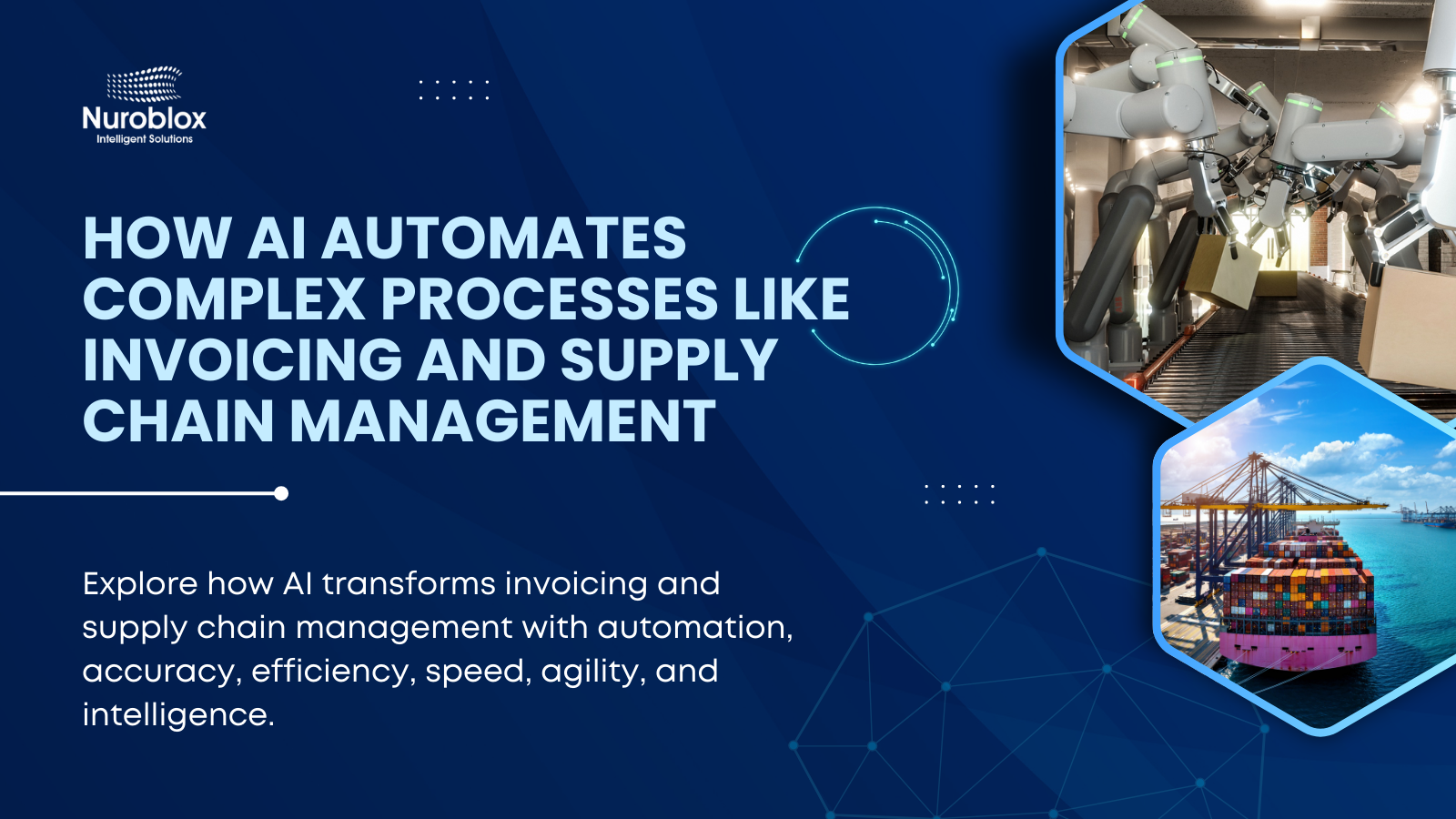How AI Automates Complex Processes like Invoicing and Supply Chain Management
Artificial Intelligence (AI) has shifted from being an experimental technology to a core driver of enterprise efficiency. Today, businesses struggle with complex, repetitive, and resource-heavy processes such as invoicing and supply chain management. Manual execution not only slows down operations but also introduces errors, compliance risks, and delays in decision-making.
AI’s ability to automate these processes has redefined the operating model of modern enterprises. By leveraging machine learning (ML), natural language processing (NLP), computer vision, and predictive analytics, organizations can now transcend traditional automation to achieve intelligence-driven workflows.
Why Automating Complex Processes Matters
The competitive landscape for enterprises is increasingly defined by operational agility. Companies that can quickly process data, minimize errors, and optimize costs gain a substantial edge. Complex processes such as invoicing or supply chain orchestration often involve:
- Multiple stakeholders (vendors, customers, logistics providers)
- High volumes of unstructured data (PDF invoices, shipment documents)
- Manual verification, reconciliation, and compliance checks
- Dependency on legacy ERP systems
Without automation, these processes cause delays in payments, stock shortages, inaccurate demand
forecasting, and customer dissatisfaction. AI-powered automation eliminates these bottlenecks through
self-learning systems that continuously refine accuracy and speed.
Role of AI in Automating Invoicing Processes
Invoicing is a critical part of revenue cycles and supplier relationships. Yet, studies show that nearly 35% of invoices processed manually contain errors (Institute of Finance & Management, 2022).
AI modernizes invoicing by enabling-
Intelligent Data Capture
- AI uses OCR (Optical Character Recognition) and NLP to extract data from invoices regardless of format (scanned PDFs, emails, images).
- Unlike rule-based systems, AI models learn to identify vendor-specific layouts, minimizing exceptions.
Automated Validation and Reconciliation
- Machine learning compares invoice data against purchase orders, contracts, and delivery receipts to detect mismatches instantly.
- This shortens approval cycles by flagging only exceptions for human review.
Fraud Detection and Compliance
- AI models analyze invoicing patterns to identify anomalies like duplicate bills or inflated amounts.
- Integrations with compliance engines ensure adherence to tax regulations and audit trails.
Straight-Through Processing
- End-to-end processing from capture to payment reduces cycle times.
- Many enterprises achieve up to 70% faster invoice approvals with AI-enabled invoicing (Gartner, Finance Process Automation Report, 2023).
Role of AI in Automating Supply Chain Management
Supply chains are inherently complex due to globalized operations, demand unpredictability, and geopolitical risks. The COVID-19 pandemic exposed severe vulnerabilities, prompting accelerated investment in AI-driven automation.
Demand Forecasting
- Predictive AI uses historical sales data, seasonality, and real-time events (e.g., weather, economic trends) to forecast demand.
- According to McKinsey (2023 report The Future of Supply Chain AI), AI-driven forecasting reduces errors by 30–50%, leading to fewer stockouts and overstocks.
Intelligent Inventory Management
- AI optimizes stock replenishment, automating reorder triggers based on predicted consumption.
- Computer vision systems enable real-time warehouse tracking and shrinkage detection.
Logistics Optimization
- Machine learning models optimize delivery routes by considering fuel costs, traffic data, and shipping constraints.
- AI-powered dynamic routing can lower transportation costs by up to 15% (DHL, Logistics Trend Radar 2024).
Supplier Risk Management
- AI analyzes supplier performance, financial stability, and social media sentiment to identify risks proactively.
- Automated supplier scoring ensures resilient multi-sourcing strategies.
Autonomous Supply Chain Planning
- AI integrates data across ERP, CRM, and IoT platforms, building real-time digital twins that simulate supply chain disruptions.
- This drives smarter and faster decision-making.
Comparing Traditional vs AI-powered Processes
| Process Area | Traditional Approach | AI-powered Automation |
| Invoice Capture | Manual data entry from paper or emails | OCR/NLP automatically extracts structured data |
| Validation & Approvals | Multiple manual verifications | AI reconciles with POs, contracts, and receipts |
| Demand Forecasting | Historical averages & gut-based estimates | Predictive AI with real-time market and event inputs |
| Logistics Optimization | Static routing tables | Dynamic, adaptive AI-based routing |
| Supplier Management | Periodic manual assessments | Continuous, AI-driven risk monitoring |
Enterprise Benefits of AI-driven Process Automation
Enterprises adopting AI-powered invoicing and supply chain automation report transformative benefits-
- Cost Savings- 20–40% reduction in operational costs due to process efficiencies (Forrester, Process Automation Landscape 2023).
- Improved Accuracy- Reduction in manual errors, fewer invoice disputes, and higher forecasting precision.
- Agility & Resilience- Enterprises can respond faster to disruptions through real-time data insights.
- Employee Productivity- Automation frees finance and logistics teams to focus on strategic work rather than repetitive tasks.
- Sustainability- Optimized routes and inventory lead to reduced carbon footprints, aligning with ESG goals.
Challenges and Considerations
Despite its potential, AI adoption comes with hurdles-
- Integration Complexity- Legacy ERP systems may require custom APIs and middleware.
- Change Management- Shifting employee roles from execution to supervision requires reskilling.
- Ethical AI Concerns- Data bias in forecasting models can affect supplier inclusion.
- Data Privacy- Invoice and supply chain data may contain sensitive financial and trade information that requires encryption.
Successful AI deployment demands strong data governance, cloud-native platforms, and collaboration between IT, finance, and supply chain leaders.

Hyperautomation, as defined by Gartner, extends beyond robotic process automation (RPA) to include AI, ML, digital twins, and advanced analytics. By 2027, over 70% of large enterprises will adopt AI-driven hyperautomation for finance and supply chain workflows (Gartner, Future of Hyperautomation 2023).
Trends shaping the future include-
- Generative AI for creating synthetic supply chain scenarios to test resilience.
- Conversational AI enabling finance teams to interrogate invoice data via natural language queries.
- Autonomous Supply Chains that respond to disruptions without human intervention.
- Extended Ecosystem Integration across vendors, partners, and logistics providers in real-time.
The Intelligent Future of Process Automation
AI is no longer a luxury but a foundational enabler for competitive enterprises. Automating complex processes like invoicing and supply chain management delivers not only efficiency but also resilience, accuracy, and cost leadership.
Companies that embrace AI-driven process automation position themselves to thrive in a volatile business environment. The journey involves overcoming integration, governance, and adoption hurdles, but the long-term rewards far outweigh the challenges.



